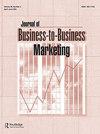The Impact of Anger and Dependence on Supplier Decision-Making
IF 2.5
4区 管理学
Q3 BUSINESS
引用次数: 1
Abstract
ABSTRACT Purpose The research combines social exchange theory with the appraisal tendency framework to explore how anger impacts supplier decision-making when threatened by customers. When making the decision whether or not to comply with customers, suppliers may be influenced by other factors explored in this study, including relational norms, procedural justice, cost-benefit analysis, mimetic isomorphism, relationship quality, dependence, and interdependence. Method Over 1,000 respondents were recruited through Mechanical Turk and participated in a scenario-based experiment with vignettes. Using high/low levels of anger, and high-low levels of dependence, each condition assessed compliance and relative importance of supplier outcomes. The study employed mixed-effects logistic regression with a random intercept, Odds-Ratios, and a three-way repeated-measures ANOVA to test hypotheses. Findings This study demonstrates that anger reduces compliance and skews five decision-making criteria. Specifically, anger inflates the influence of (1) relational norm violation and (2) procedural justice but reduces the importance of (3) mimetic isomorphism. Contingent upon whether the supplier is dependent or not, anger can lower the influence of (4) cost-benefit analysis (if not dependent) and (5) relationship quality (if dependent). Research Implications This manuscript addresses the calls for more research by the academic community suggesting that in order to understand B2B exchanges more deeply Social Exchange Theory (SET) should be combined with other theories.While integrating the appraisal tendency framework (ATF) and SET, this study reduces criticisms about prior research that ignore emotions in social exchanges and provides ideas for how organizational decision-making can be influenced by anger. Practical Implications By understanding how anger influences suppliers, both parties can make better decisions and decrease the possibility of relationship dissolution. Originality/Value/Contribution This study highlights the role of anger in organizational decision-making.愤怒和依赖对供应商决策的影响
摘要目的本研究将社会交换理论与评估倾向框架相结合,探讨当受到客户威胁时,愤怒如何影响供应商决策。在决定是否遵守客户的要求时,供应商可能会受到本研究中探讨的其他因素的影响,包括关系规范、程序公正、成本效益分析、模仿同构、关系质量、依赖性和相互依存性。方法通过Mechanical Turk招募了1000多名受访者,并参与了一项基于场景的小插曲实验。利用高/低水平的愤怒和高-低水平的依赖,每种情况都评估了供应商结果的合规性和相对重要性。该研究采用了随机截距、比值比和三元重复测量方差分析的混合效应逻辑回归来检验假设。研究结果这项研究表明,愤怒会降低依从性,并偏离五个决策标准。具体而言,愤怒扩大了(1)关系规范违反和(2)程序正义的影响,但降低了(3)模仿同构的重要性。根据供应商是否依赖,愤怒可以降低(4)成本效益分析(如果不依赖)和(5)关系质量(如果依赖)的影响。研究启示这篇手稿回应了学术界对更多研究的呼吁,建议为了更深入地理解B2B交换,社会交换理论(SET)应该与其他理论相结合。在整合评估倾向框架(ATF)和SET的同时,本研究减少了对先前研究忽视社会交往中情绪的批评,并为组织决策如何受到愤怒的影响提供了思路。实际意义通过了解愤怒如何影响供应商,双方可以做出更好的决定,降低关系破裂的可能性。原创性/价值/贡献这项研究强调了愤怒在组织决策中的作用。
本文章由计算机程序翻译,如有差异,请以英文原文为准。
求助全文
约1分钟内获得全文
求助全文
来源期刊
CiteScore
2.20
自引率
35.70%
发文量
22
期刊介绍:
The Journal of Business-to-Business Marketing® encourages diversity in approaches to business marketing theory development, research methods, and managerial problem solving. An editorial board comprised of outstanding, internationally recognized scholars and practitioners ensures that the journal maintains impeccable standards of relevance and rigorous scholarship. The Journal of Business-to-Business Marketing features: •basic and applied research that reflects current business marketing theory, methodology, and practice •articles from leading researchers covering topics of mutual interest for the business and academic communities

 求助内容:
求助内容: 应助结果提醒方式:
应助结果提醒方式:


